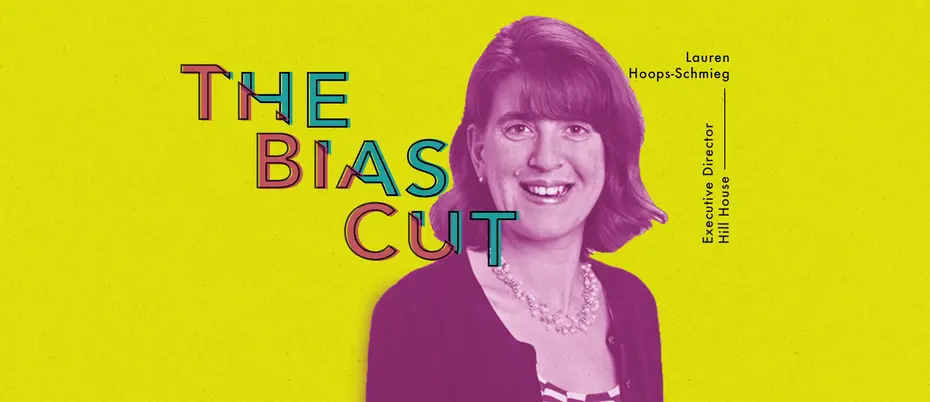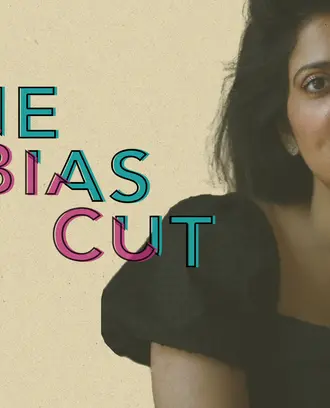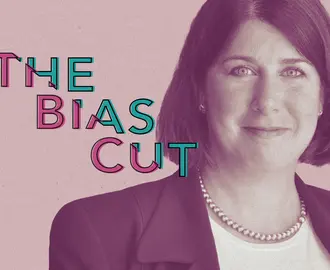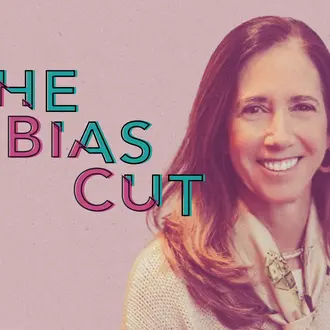The Bias Cut
Why this nonprofit executive champions work-family flexibility
“I think women need to hear what’s possible and how we stand on the shoulders of those who came before us, and I need to make sure my shoulders are strong and steady for those who come after me.”
A 2020 women’s leadership study from LeanIn.org and McKinsey & Co. found that American women held less than 40% of corporate management positions, and women continue to fight underrepresentation when it comes to board positions and CEO roles. They also face gender bias, harassment, and opposition to their management styles. Here’s how one MIT Sloan alumna has pushed back on those statistics and used what she’s learned along the way to help those behind her.
Lauren Hoops-Schmieg, EMBA ’18, executive director of Hill House, a nonprofit community center in Boston
In what ways is your professional life as a woman in the workplace different from how you imagined it would be when you started your career?
In my early years, I saw rapid growth in my career in terms of promotions and salary because I didn’t have to worry as much about work-life balance. That all changed when I had to consider child care, commute time, business travel, and the long hours that were still expected. Once I started having to make choices (reducing my travel schedule, trying to work more reasonable hours, etc.), I think I was viewed as someone who was no longer on a fast track despite having shown my value, my ability to still deliver high-quality results, and exceed my goals. It was a shock.
Eventually, I changed industries from scientific publishing to nonprofit youth development, as I had known through my mother — who was an executive in the nonprofit field — that a better balance for my family was possible without sacrificing the ambition and intellectual curiosity that I hoped to fulfill through my career.
Who was an ally or mentor for you as you’ve navigated your career? What made that person stand out, and how specifically did they help you get to the next level of your professional development?
My mother finished college while she was raising us and managing her career. I am still in awe of how she balanced it all. I also had a publisher of a magazine I was working for, who had clearly hit the glass ceiling at our company. Rather than accepting the limits, she went on to be a fellow at the London School of Economics for two years. And my friend’s mother once told a story around the dinner table of how she came to a decision of going back to school to get her master's degree in social work and social work license after age 45. She was apprehensive because she realized she wasn’t going to be finished until after 50. She said her friend told her that she was going to be 50 anyway, so why not be 50 with an advanced degree.
Those three women inspired me to take a risk and pursue my MBA at MIT Sloan through the EMBA program. I think it is important to tell these stories so that the women who come after us know that it is never too late, and that we have many before us to thank for their trailblazing — particularly when encouraging further education to keep us competitive and sharp.
Can you give an example of a time you’ve experienced or witnessed gender bias? How did it affect you professionally? What impact did it have on your job?
I think experiencing gender bias can be explicit or implicit. For me, it was definitely implicit. Women who wish to pursue their career and raise a family face choices that men do not.
I think the first surprise was when I went on maternity leave, and about two weeks before I was set to return my supervisor asked me to come to the office so we could chat. He asked me if I was returning once my maternity leave was over. I was blown away as I had never indicated or even hinted that I had any other plans but to return — especially as during my leave I had been performing certain tasks from home and keeping up with some of my larger projects. I could tell I was already being seen in a different light. I can’t recall any of my male colleagues who had also recently started a family relaying similar conversations.
I remember once I returned not wanting to work nine to 12 hours per day, and started leaving more on time to be with my son. My husband and I considered moving closer to the city to reduce my commute, but the cost of housing and child care closer to the city on my current salary wasn’t sufficient. When I spoke to my supervisors about the possibility of receiving an increase, their response was that I should first move closer to the city to demonstrate my commitment to staying there and then they would consider an increase. It was a Catch-22. I decided to leave shortly thereafter as I could see a dead end ahead.
Certain industries are as male-dominated as ever. Where do you see progress in your own professional experience and how can we scale that throughout your industry?
There are certain cultural-social barriers in gender bias that intersect with class that exacerbate the situation. For example, golfing was an important means for many of the men to socialize and talk business at the publishing house for which I worked. For a woman who did not come from an affluent background and who didn’t golf, there was a key social and business opportunity to golf that I didn’t have access to, that I didn’t even realize was something I should even consider pursuing until a few years into my career — and I still don’t golf.
At another organization at which I worked, we attended many conferences in Las Vegas. Many of the senior executives and those they were tapping for more major roles would have nights out that included a lot of gambling and drinking. The expectation was that if you wanted to be on that track, you had to participate. At the time, I was pregnant with my second child, and those options weren’t feasible, or even something I might have wanted to participate in even if I wasn’t pregnant.
I moved to the nonprofit field as it was more conducive to career growth while also growing my family. Until women have access to social and cultural experiences that don’t interfere with being a mother (affordable child care, recognition of different backgrounds that might not want to participate in traditional male-centric activities, etc.) or they themselves are setting the narratives and expectations that are based on ability rather than other expectations, then scaling may be out of reach.
How do you support women coming up behind you?
I vowed that should I ever get to a position of power — the place where I can make it better for women in their late 20s through 40s to balance a family with their career — that I would pay it forward and make it easier for them.
As an executive director, I have worked with my board to make some real changes and opportunities for the staff. We’ve implemented an open leave policy that allows for a more flexible paid time off arrangement. We’ve provided flexible work-from-home options for some of the mothers on our staff so that they can spend some time in the office and some time at home. And it isn’t just about the mothers. We’ve extended six-week paid paternity leave and some of those flexible work-from-home opportunities for the fathers at our organization. We want fathers to be able to support their wives in their careers and also to understand, firsthand, the balance that is necessary for raising a family (and maybe, when they have more influence and power, they can make policies that make it easier for staff raising families).
And I tell these stories. I think women need to hear what’s possible and how we stand on the shoulders of those who came before us, and I need to make sure my shoulders are strong and steady for those who come after me.
What is the most difficult lesson you’ve learned in your professional life? In what unexpected ways did you grow from it?
A career path is not a straight path. You truly don’t know where your journey will take you. Sometimes I miss science publishing: the travel, the science, working for a multinational corporation. When I became a mother and switched industries, I worried about what opportunities would be available to me. I’ve been able to make new opportunities, and a lot of that is grounded on my own personal values of continually learning and staying curious.
I love working in the nonprofit sector and the shared values and ability to make a difference in new ways, particularly for kids. There are still challenges, and this pandemic has certainly presented new problems, particularly with working and trying to navigate the kids’ social and emotional well-being combined with their schoolwork. That said, my hope is that more workplaces will be able to see how possible it is for their employees to thrive and be successful in a remote environment and that realization will lead to more women being able to better balance their obligations because they have more flexible options available to them.




